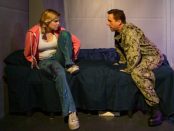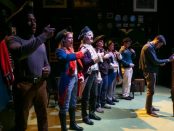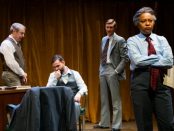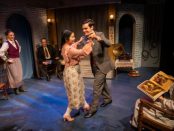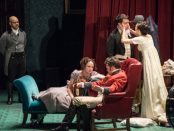Russ Rowland
Russ Rowland photographs everything from theater and corporate events to portraits, abstracts, street scenes, landscapes and images that he creates on the computer in various ways. Many things interest him visually, and he’s a relentless experimenter. http://www.rrsnapshop.com
The problem with the show now at The Jerry Orbach Theater is director Tim Drucker’s frenetic, over-the-top staging and the artificially broad presentational style of the acting, similar to - but beyond - what he did in his 2019 production of "Love Actually? The Unauthorized Musical Parody" at the same theater. It is as though he does not trust the material. Matthew Fischer’s sound design for the taped score by composer Assaf Gleizner (to Gleizner’s orchestrations) is overly loud and fast, overpowering the clever lyrics which are well worth hearing for their stinging barbs at the television series. It also makes all of the songs sound the same, except for some short, slower folk ballads set to guitar accompaniment which are mostly oddball numbers for Phoebe to play in her gig as a folksinger. [more]
About Love
The inspiration for "About Love" is Ivan Turgenev’s "First Love," one of the greatest of all novellas. Subtitled “a play with songs and music,” that is exactly what it is: a dramatic presentation with five songs and underscoring by jazz musician and composer Nancy Harrow. However, unlike Harrow’s adaptation of Hawthorne’s "The Marble Faun," retitled "For the Last Time," director Will Pomerantz’s text appears to be taken directly from a translation from the original Russian without anything additional. The lovely show is best described as story theater in which all of the characters narrate at one time or another, at times alternating a single event, and all but the hero and heroine playing multiple roles. If one is looking for a musical, this is not it, but it eventually is a captivating staging of the story, if a bit on the long side. [more]
Rules of Desire
"Extremities" on a ship best sums up its playwright William Mastrosimone’s adept, if off-kilter, new psychological thriller "Rules of Desire," that’s been given a tidy production. In it, a dim 22-year-old U.S. Navy enlistee smuggles his troubled 18-year-old girlfriend in a duffel bag onto the aircraft carrier on which he is stationed. The couple surreptitiously sets up house in an airlock, but their connubial bliss is threatened by the licentious Chief Petty Officer discovering their love nest. Psychosexual hijinks ensue. [more]
Seesaw
Although J2 Spotlight’s artistic director Robert W. Schneider who staged this show has given it a vigorous production and cast a delightful Gittel in Stephanie Israelson, he is unable to disguise the show’s flaws. He is not helped by the trite, derivative choreography by Caitlin Belcik for a show that is mainly dance and has eight dancers out of a cast of nine. The many production numbers are both busy and familiar, and keep the ensemble composed of Kyle Caress, Chaz Alexander Coffin, Katie Griffith, Caleb Grochalski, Morgan Hecker and Halle Mastroberardino spinning throughout the show. [more]
Happy Birthday Doug
Mr. Droege’s sharp and well-observed writing renders each of these familiar figures with biting depth, achieving grand mini-portraiture. Though preoccupied with comedy, an undercurrent of proportioned sentiment elevates the work above mere caricature. Promiscuity, aging, drugs, alcohol, loneliness and the past are among the issues eloquently explored in relation to the gay male lifestyle. Droege’s shrewd structure has each of the participants alternatively popping up to chatter while imparting pertinent personal details, fueling the semblance of a narrative. [more]
Romeo & Bernadette: A Musical Tale of Verona & Brooklyn
"Romeo & Bernadette," a fresh take on Shakespeare’s oft-adapted tale of love, is an unabashed valentine to inter-era romance. Shakespeare’s Romeo (cutie-pie Nikita Burshteyn, perfectly cast) is magically time-travelled to 1960’s Brooklyn to seek Bernadette (beautiful Anna Kostakis who plays both the foul-mouthed Bernadette and the demure Juliet), a striking doppelganger of his beloved sixteenth century Juliet. There he meets members of two rival Italian mobs who substitute, 1960-style, for the Capulets and Montagues. [more]
How to Load a Musket
An essay more than a play, with players as opposed to characters, "How to Load a Musket" is a racist diatribe that fails to make its points coherently. The costumes and appointments on the walls of a black box space say all that there is to say in a play that ultimately leaves one wanting for more. The scenic design by Lawrence E. Moten III is the show’s best asset. [more]
The Santa Closet
Houses on the Moon Theater Company’s delightful and earnest mission is to “dispel ignorance and isolation through the theatrical amplification of unheard voices.” "The Santa Closet," another one-man show written and performed by the company’s co-founder Jeffrey Solomon, doesn’t reach the lofty goals of some of his other plays; however, the newly updated, tenth-year anniversary production of this frothy, zany tale is nevertheless aloft with quite a few grins and chuckles. [more]
Confidence (and the Speech)
Political plots can be dry as toast. Hatem attempts to spice things up by crossing the genders of the actors playing Carter and young Cynthia; the convention is an interesting choice although it really doesn’t add any new light to the characters or story and is sometimes distracting. Not to worry, though, the script is smart, imaginative, humorous at the right times and keeps its audience interested. [more]
Hooked on Happiness
Although the show is 80 minutes without an intermission, it just breezes right by and one is never bored. The music, played by Peter Dizozza (on piano), Ralph Hamperian (on bass) and Art Lilliard (on drums), keeps the show moving at perfect tempo. From ballads to disco tune, from rap to group numbers, the music is spot on. Sound designer Alex Santullo delivers a pitch-perfect musical. [more]
Panama Hattie
While the original production had a great many one-of-a-kind stars supporting Merman, one of the distinctions of the York production is its cast: Montel has been able to obtain the services of Klea Blackhurst for Hattie Maloney, the Ethel Merman role. Blackhurst, you may know, has specialized in Merman for years including her tribute show "Everything the Traffic Will Allow" as well as appearing in the Merman roles in revivals of "Anything Goes," "Red, Hot and Blue," "Call Me Madam" and The York’s staging of "Happy Hunting." Montel has also surrounded her with seasoned theater veterans including Stephen Bogardus, Simon Jones, Gordon Stanley and David Green. The members of the singing and dancing chorus are equally talented. [more]
Bars and Measures
The play’s dynamic—with the two brothers trying to stay in sync even as they find themselves polar opposites in nearly all areas of their lives—seems at points to make the play a kind of clunky “what if” scenario from a modern-problems textbook (the punny title doesn’t help). However, Goodwin’s talent for writing smart, occasionally amusing dialogue and for making his characters seem like real people rather than emblems largely mitigates that concern. Also, the work of the actors in this production is quite strong. [more]
Katsura Sunshine’s Rakugo
Katsura Sunshine is the stage name of this charismatic 49-year-old Toronto-born performer who relocated to Japan and apprenticed to a Rakugo artiste. Mr. Sunshine eventually became a notable practitioner in his own right and has the distinction of being a Westerner. Sunshine is affable, animated and possessed of a pleasing fast-paced vocal delivery that demonstrates comic timing and dramatic heft with a Canadian lilt. This vocal expressiveness combined with his shock of jagged blonde hair, striking facial features that he contorts into a gallery of expressions enables him to command the stage. Wearing a kimono, kneeling at a small table and handling the hallowed props of a fan and a hand cloth, he evokes the genre’s essence with assured authenticity. [more]
Tech Support
Deborah Whitfield’s 'Tech Support" offers a clever idea in order to review feminism in the past century. Unfortunately, her rather superficial approach misses a great many opportunities. The romantic comedy aspect of the play is not entirely believable and works to the detriment of the play’s serious elements. The slick production is entertaining without ever delving below the surface even though it attempts to cover a great many important and serious issues, many of which are not yet solved today. Don’t blame the actors who do their best with the material they have been given. [more]
Stormy Weather
Mr. Wills’ demonstrates a facility for dramatic writing with his snappy dialogue and fast-paced scenario that inspires laughter and also incites thoughtfulness. Amidst the merriment are keen insights into the gay male experience including aging, relationships and promiscuity. "Stormy Weather," though, is more Ray Cooney than Tony Kushner. [more]
I Spy A Spy
Cluttered, lively and quaint, the zany musical comedy "I Spy A Spy" is reminiscent of the sort of lightweight material directorial legend George Abbott would have had a go at in the late 1960’s. This show recalls the Abbott efforts "How Now, Dow Jones" and "The Education of H*Y*M*A*N K*A*P*L*A*N" that William Goldman analyzed in his classic 1969 behind the scenes account "The Season." Abbott did his best with those disappointments just as the creative team for I Spy A Spy does. [more]
Reborning
There is a prevailing sense that the script tries to cover too much intellectual ground on the topic of reborning in too short a time frame, placing a burden on the characters to experience more than would seem realistic in an ordinary world. Nevertheless, through the efforts of the actors and valiant direction by Triolo, this dark play does succeed in bringing to light some of the complexities of motherhood, child loss and abandonment through the very unique reborning lens. Check it out for yourself. [more]
Madame Lynch
Eliza Lynch (1833-1886) was an Irishwoman who grew up in France and became a courtesan. In 1854 she began a relationship with Francisco Solano López, the son of Paraguay’s president. He later succeeded his father and Lynch became First Lady. He was killed in battle in 1870. Her time in Paraguay was controversial as she was thought to have instigated wars and conflicts. She was banished and returned to France, dying in obscurity. Thank you, Wikipedia, for these details because they’re scant in this treatment. Ms. Sherwood and Mr. Flanagin are more concerned with superficial theatrics rather than concretely crafting a comprehensible narrative chronicling the life of a fascinating figure who was a cross between "Barry Lyndon" and "Evita." [more]
Original Sound
The eternal heartbreak of show business is given a fresh spin in playwright Adam Seidel’s exhilarating contemporary drama, "Original Sound" that skewers the music industry. Mr. Seidel’s scenario has many familiar elements, but the writing is impeccable, the performances are superior, and it's electrically presented. [more]
Eat the Devil
In this madcap universe, passengers on a jet are caught in a space warp known as a “corn hole” that was caused by Amazon’s tampering with the atmosphere to speed up delivery times, Amazon is developing a female sex robot, and an insidious virus is unleashed. This pestilence manifests itself by causing people to become “furries” where they identify as animals and wear appropriate physical embellishments. The population has internet chips implanted in their heads, “Blow Hole” a cross of Facebook and YouTube is the prime communications platform, and “twats” go viral on “Twatter.” [more]
Anne of Green Gables: Part I
Directed with touching simplicity by Henry and choreographed with a lyrical flow by Lorna Ventura, this Anne tells the well-known story utilizing a combination of voiceover readings, projections, dance, mime and fine acting. Henry has turned Anne into a dance play with an original take on this oft-told tale of a spunky, intelligent and witty young lady guarded by a mute Greek chorus of four who reflect and illuminate her inner thoughts and feelings. [more]
Kennedy: Bobby’s Last Crusade
There are some fine elements in the portrayal. Arrow’s Kennedy-clan dialect seems believable—though maybe slightly over-baked at points (especially when, late in the play, he sings bits of Woody Guthrie’s “This Land Is Your Land”). Happily, he is able to suggest Kennedy’s deep compassion for forgotten, disadvantaged Americans. But because we don’t see him interacting one-on-one with other characters, he’s hampered in his ability to make this quality fully evident. [more]
The Book of Merman
The witty score with music and lyrics by Schwartz is a collection of both pastiche songs based on numbers Merman made famous and new ones that fit her style that suggest other famous songs. Directed and choreographed by Joe Langworth in a brisk and breezy fashion, "The Book of Merman" is a diverting, entertaining show that will be best enjoyed by musical comedy aficionados who know their Merman from their Mary Martin as there are a great many in-jokes. [more]
Inner Voices 2018
Three original one-act solo-performer musicals comprise "Inner Voices 2018," presented by the Premieres theater company. Since 2008 they’ve produced several editions of this enterprise. The format was inspired by British playwright Alan Bennett’s 1980’s and 1990’s acclaimed "Talking Heads," which were a series of 13 separate monologues that were originally broadcast on television and subsequently adapted for the stage. Here, the monologues are set to music and it’s cumulatively pleasing. [more]
The Stone Witch
Lauria, best known for his work on "The Wonder Years," makes Simon an immensely private and enigmatic figure. His erratic behavior changes by the moment, keeping Peter (and us) guessing. We are never certain whether he had incipient dementia or is faking or is suffering from malnutrition or dehydration living for so long in a cabin in the woods. This is a big performance and Lauria brings great authority to his role. [more]
Draw the Circle
... in Deen’s mad dash to portray Shireern’s elderly Indian father and mother--who live in Connectictut--her girlfriend, Molly, and so many other figures, including even a housecleaner at a Motel 8, where Shireen attempted suicide--he seems to have a different voice and demeanor for every one of them. He even--on his knees and with a little girl’s voice--plays Shireen’s five-year-old niece, Rabia. [more]
Mr. Chekhov and Mr. Porter
The first act is a faithful and skillful hour-long condensation of "The Seagull." The second act is a clever hour-long vaudeville-style amalgam of "The Cherry Orchard," "Uncle Vanya" and "The Three Sisters" in the detailed manner of one of Mel Brooks’ cinematic parodies. [more]
Balls
Playwrights Kevin Armento and Bryony Lavery take the well-known facts that have been explored in documentaries and in the feature film "Battle of the Sexes" and shovel on a cascade of imagined sub plots, heavy-handed theatrical techniques and sociological trimmings. The opening voice-over prologue is a wry pseudo-scientific lecture about men and woman. This narrator sounds like Jane Lynch at her most sarcastic and it’s supposed to be funny but falls flat. The strident tone of the show is set. [more]
Jerry’s Girls
The revival at the York is being seen in yet a new version of the show that began as a cabaret in 1981 and went to Broadway in 1985. Created by director Larry Alford, choreographer Wayne Alford and composer Herman, the original show included new songs written especially for the show, only one of which remains in the revival. However, as directed by Pamela Hunt ("The Musical of Musicals"), this version of "Jerry’s Girls" organizes the songs more faithfully by around each show and includes the greatest hits from "Hello, Dolly!," "Mack and Mabel," "Milk and Honey," "Mame," two numbers from "Dear World," and ending with a medley from "La Cage aux Folles." Along the way are also two unfamiliar numbers from Herman’s 1960’s revue "Parade." [more]
Heartbeat Opera: Butterfly
The artistic team responsible for this "Butterfly" made radical decisions and changes. Puccini’s original three acts of linear story – love and “wedding,” waiting, betrayal and death – are reorganized and abbreviated into three scenes of waiting, remembered love, and then betrayal. Some minor characters in the original opera are eliminated to create a caste of just five singing characters. The entire orchestra is reduced to a chamber orchestra of just six musicians, the Cantata Profana. The adaptation of Puccini’s orchestral score for this small chamber group by Daniel Schlosberg is remarkable: unexpectedly, its absolute faithfulness to Puccini’s musical intent at almost every turn made up for the diminished number of musicians. [more]
Vanity Fair
Tucker’s production uses seven actors playing 20 named characters plus members of the ensemble: the women (Joey Parsons and Hamill play one each, good girl Amelia Sedley and bad girl Becky Sharp, respectively) and the men play all the rest, including other female characters with the addition of wigs and slight costume changes. This allows the cast to demonstrate tremendous versatility in these juicy roles. [more]
Church & State
Rob Nagle (who created the role in the Los Angeles production) plays “compassionate conservative” North Carolina Senator Charles Whitmore who is up for reelection in a statistical dead heat in just three days’ time, running on a campaign slogan of “Jesus is my Running Mate” (chosen by his wife Sara). However, earlier that day he has been shaken by attending the funeral of 29 students shot by a lone gunman at the local elementary school which his sons attend. It could have been his sons who had been killed. [more]
Diva: Live From Hell
"Diva: Live From Hell," an energetic, campy variation on the “All About Eve” theme, is performed with manic glee by Sean Patrick Monahan who also wrote the book and created all the colorful characters. His partner in crime is Alexander Sage Oyen who provided the music and lyrics. Sex (requited and unrequited), ugly violence and dark humor are all thrown into the story which is told by Desmond Channing (Monahan, who also plays virtually a high school’s worth of characters). [more]



